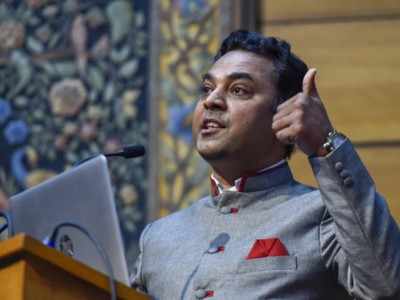- News
- Business News
- India Business News
- Covid: Second wave's peak may be reached in mid-May, says CEA Subramanian
Trending
This story is from April 20, 2021
Covid: Second wave's peak may be reached in mid-May, says CEA Subramanian
Amid surging coronavirus cases across the country, chief economic adviser (CEA) K V Subramanian on Tuesday said the peak for the second wave of the pandemic might be reached by the middle of the next month and expressed hope that its impact on the economy would not be large.

NEW DELHI: Amid surging coronavirus cases across the country, chief economic adviser (CEA) K V Subramanian on Tuesday said the peak for the second wave of the pandemic might be reached by the middle of the next month and expressed hope that its impact on the economy would not be large.
He said his assessment on the peak for this fresh wave of Covid-19 cases is based on research done by various bodies, including the Indian Council of Medical Research (ICMR).
"I am not an epidemiologist. I am just looking at it...I have read far more papers on epidemiology than on economics, but based on some very nice mathematical modelling of the Covid pandemic by IIT Kanpur and based on some of the research put out by ICMR etc, I am saying it's likely that India's second wave peak might be around mid-May," he said.
Addressing a virtual event organised by Great Lakes Institute of Management, Subramanian said he is not an expert in this area so his assessment should be taken with enough caveats.
He said India has worked on turning the crisis into opportunity by implementing a slew of reforms for addressing supply-side constraints.
"Capital expenditure driven growth is far more likely to generate sustained growth because it leads to fiscal policy and monetary policy being in sync with each other rather than contrasting with each other," he noted.
There are a lot of fundamental aspects that have been put in place so that the impact of the pandemic is minimised to the largest extent, he said.
On the macroeconomic front, he said some of the steps taken at the moment will bear fruits 18-20 months later.
Citing the example of the 1991 liberalisation, he said it took more than two years for growth to hit over 6 per cent post opening up of the economy.
He said his assessment on the peak for this fresh wave of Covid-19 cases is based on research done by various bodies, including the Indian Council of Medical Research (ICMR).
"I am not an epidemiologist. I am just looking at it...I have read far more papers on epidemiology than on economics, but based on some very nice mathematical modelling of the Covid pandemic by IIT Kanpur and based on some of the research put out by ICMR etc, I am saying it's likely that India's second wave peak might be around mid-May," he said.
Addressing a virtual event organised by Great Lakes Institute of Management, Subramanian said he is not an expert in this area so his assessment should be taken with enough caveats.
On the long-term impact of the fresh wave on the economy, he said it should not be large as the government has taken several steps to check production loss, especially by MSMEs.
He said India has worked on turning the crisis into opportunity by implementing a slew of reforms for addressing supply-side constraints.
"Capital expenditure driven growth is far more likely to generate sustained growth because it leads to fiscal policy and monetary policy being in sync with each other rather than contrasting with each other," he noted.
There are a lot of fundamental aspects that have been put in place so that the impact of the pandemic is minimised to the largest extent, he said.
On the macroeconomic front, he said some of the steps taken at the moment will bear fruits 18-20 months later.
Citing the example of the 1991 liberalisation, he said it took more than two years for growth to hit over 6 per cent post opening up of the economy.
End of Article
FOLLOW US ON SOCIAL MEDIA















